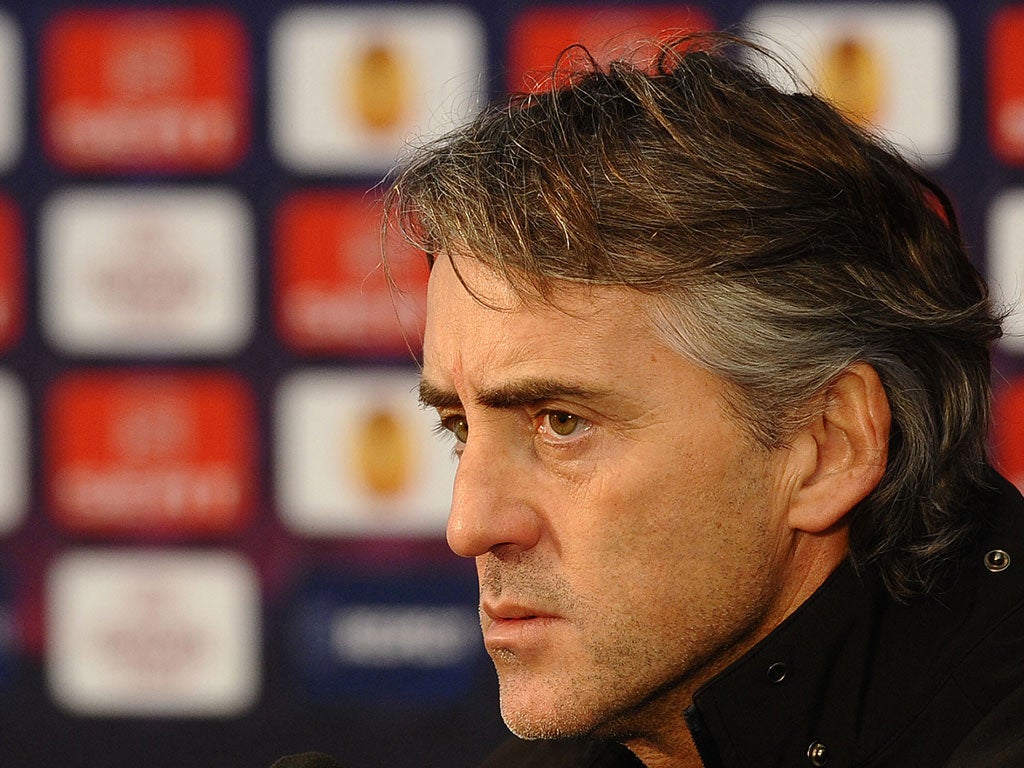English screening system is inadequate, insists Mancini
City manager responds to Muamba horror by saying there must be more rigorous medicals

Manchester City manager Roberto Mancini said yesterday he will urge his club to pursue with the Premier League and Football Association his concerns about a medical screening system which he believes is an inadequate safeguard against the type of catastrophic heart failure which has left Fabrice Muamba fighting for life.
Muamba continued his tentative recovery at London's Chest Hospital yesterday but concerns over clubs' failure to put players through annual cardiological examinations, revealed in The Independent yesterday, were echoed by Mancini, who said that he remained dissatisfied with the rigour of his own club's medical screening which – despite the sudden death of the club's Cameroonian midfielder Marc-Vivien Foe in an international nine years ago – he felt was inadequate from the moment he arrived at the club two years ago.
"I think here in England it is the best championship in the world, and everything is fantastic. But we need to improve the medicals for the players. We need to screen the players often, maybe two times a year, and more accurately. When I first saw our medicals two years ago, I was really worried. I said we need to do better in our medicals. It is not only after [Muamba's collapse on Saturday] but always. It is impossible that a young guy can die on the pitch because he didn't do a proper, accurate medical. I want all players to have more accurate medicals, not just once a year, but every six months. We do that in Italy and the medicals are really accurate. It is really important. What happened with Muamba and with other players in the past can't happen."
Cardiologist Dr Amanda Varnava of London's St Mary's Hospital, who has worked with Tottenham Hotspur, Fulham, Stoke City, West Ham and Watford, told The Independent on Monday that the current system could see a player go unscreened for long periods beyond an initial academy cardiological test at the age of 16 or under. She said that annual ECGs in Italy for every young player between the ages of 12 and 18 had cut sudden deaths by 90 per cent. In the UK, 12 young people under the age of 35 die each week as a result of chronic heart failure.
Mancini, whose side will seek to reduce Manchester United's four-point Premier League lead when they entertain Chelsea tonight, said he was concerned about the English system. "It is really good and better in Italy. The medicals for all players are fantastic," he said. "When I came here two years ago and saw all the players in pre-season for their medical, I said to the doctor 'This is not enough for the players'. I felt it was a really light medical. I asked why and they said, in England, it is like this. But it is not enough.
"The medicals are really strong in Italy during pre-season, for every player, and they happen every six months. Ten years ago, we would do it once a year, but since then it has been every six months. I spoke with the [City] doctor last summer and he said that this is how it is done in England. But for me, it is not good."
Italy's own appreciation of the potential for heart problems among players was enhanced after Kanu's medical examination at Internazionale revealed a defect which required surgery in 1996 to replace an aortic valve. The Senegalese player Khalilou Fadiga's brief period at San Siro with Internazionale also coincided with Mancini's before heart problems forced his departure from the club.The Premier League and Football Association said they are prepared to re-examine their systems.
Mancini has expressed his concerns about City's regime to club doctor Dr Philip Batty. And although City do undertake heart scans every season – exceeding Uefa recommendations – the manager said he was still "not satisfied". "My personal opinion is that I am not satisfied with this because the medicals are really light. I hope the club will speak with the [Premier League] and FA and it is the same for the other clubs. In 2012, it can't happen that something happens to a player like happened on Saturday, it is impossible. This guy is 23. I hope that it will go very well for him and I pray for him because this [situation] is impossible. I am surprised because everything is perfect here, but now we need to improve for the players. I hope next summer we can do it better."
The Professional Footballers' Association has invested millions of pounds since 1992 in a system of full ECGs and echocardiographs tests on young players, co-ordinated by the eminent cardiologist Dr Len Shapiro, of Cambridge's Papworth Hospital. But the enlargement of the heart which is the most common cause of catastrophic collapses like Muamba's tends to occur from the age of 13 to adulthood, which is why Dr Varnava wants to see annual checks between 13 and the ages of 18 or 21.
Subscribe to Independent Premium to bookmark this article
Want to bookmark your favourite articles and stories to read or reference later? Start your Independent Premium subscription today.

Join our commenting forum
Join thought-provoking conversations, follow other Independent readers and see their replies